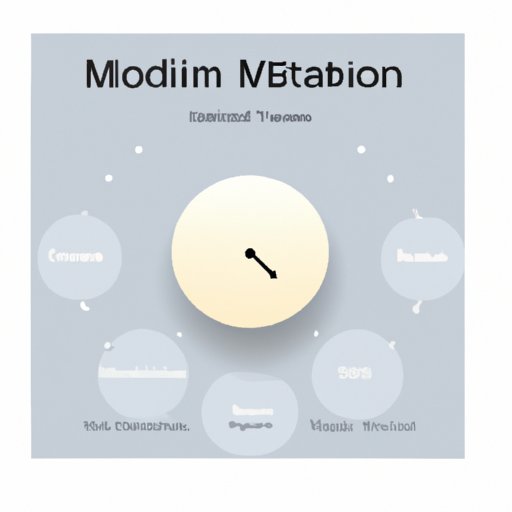
Introduction
Do you struggle with getting a good night’s sleep? You’re not alone. According to the American Sleep Association, over 50 million people in the United States have a sleep disorder. Melatonin is a natural hormone that can help regulate sleep patterns and promote restful sleep. However, taking melatonin at the wrong time can have the opposite effect, making it essential to understand the optimal timing for melatonin intake.
The Science Behind the Optimal Time for Taking Melatonin Before Bed
Melatonin is a hormone that plays a crucial role in regulating the body’s internal clock and sleep cycles. It is naturally produced in the brain’s pineal gland, and its secretion is aligned with the circadian rhythm. The circadian rhythm is the body’s 24-hour cycle that dictates when we feel awake and when we feel sleepy.
Research studies have shown that melatonin’s effectiveness depends on the timing of intake. Taking melatonin at the wrong time can cause grogginess and other side effects, while taking it at the right time can help regulate sleep patterns and improve sleep quality.
5 Factors to Consider When Deciding When to Take Melatonin: Your Guide to a Peaceful Night’s Sleep
Several factors influence the optimal time for taking melatonin:
1. Age, gender, and weight
Age, gender, and weight can affect how much melatonin the body produces and how well it absorbs it. Generally, older adults produce less melatonin, while women tend to have higher levels. As for weight, taking a higher dosage of melatonin may be required for overweight individuals.
2. Dosage and form
Choosing the right melatonin supplement and amount for individual needs is crucial. Melatonin supplements come in different forms, including pills, gummies, and liquids. Dosage varies based on the individual’s age, gender, weight, and other factors. When starting with melatonin, it’s best to begin with a low dose and gradually increase until the desired effect is achieved.
3. Sleep problems
Melatonin can help regulate sleep patterns for people with different types of sleep disorders such as insomnia, jet lag, and shift work. Melatonin can help people fall asleep faster and sleep more soundly.
4. Lifestyle and habits
Establishing a consistent sleep routine and avoiding certain activities before bed can help optimize melatonin’s effectiveness. Avoid consuming caffeine, alcohol, nicotine, and using electronic devices before bedtime. It’s also helpful to create a relaxing bedtime routine to signal to your body that it’s time to sleep.
5. Other medications and health conditions
Individuals taking other medications or with underlying health conditions should be cautious when taking melatonin. Melatonin can interact with other medications, and individuals with autoimmune diseases, depression, or epilepsy should consult with their healthcare provider before taking it.
Experts Weigh In: The Best Time to Take Melatonin for Optimal Results
Sleep experts, doctors, and researchers have varying opinions on the best time to take melatonin for optimal results, depending on each individual’s specific needs.
For long-term use, melatonin should be taken 2-3 hours before bedtime, allowing the body to absorb it properly before sleep. For jet lag, melatonin should be taken 30 minutes before bedtime for several days until the body adapts to the new time zone. For shift workers, timing depends on the specific shift schedule.
Tackling Insomnia: The Role of Melatonin Timing in Treatment
Insomnia is a common sleep disorder that can be challenging to overcome. Melatonin can help regulate sleep patterns for individuals with insomnia, making it an effective treatment option. Melatonin can improve sleep onset and duration, making it easier for individuals with insomnia to fall asleep and stay asleep.
When incorporating melatonin into an insomnia treatment plan, it’s essential to consider the individual’s specific needs. Factors such as dosage, timing, and duration of use all play critical roles in optimizing melatonin’s effectiveness as a sleep aid.
Night Owls vs. Early Birds: Why Timing Matters When Taking Melatonin
Chronotype and sleep preference influence how effective melatonin is at helping individuals fall asleep and stay asleep. Night owls tend to have a harder time falling asleep and waking up in the morning, while early birds tend to fall asleep quickly and wake up early.
For night owls, melatonin should be taken later in the evening, around 2-3 hours before their desired bedtime. For early birds, taking melatonin earlier, 3-4 hours before bedtime, may be more effective.
Conclusion
Finding the right timing for melatonin intake is essential for optimal sleep quality. Factors such as age, gender, weight, dosage, sleep problems, lifestyle, and other medications and health conditions all play a role in determining the optimal time for taking melatonin. By understanding these factors and consulting with healthcare professionals, individuals can incorporate melatonin into a comprehensive sleep routine and enjoy restful sleep.




